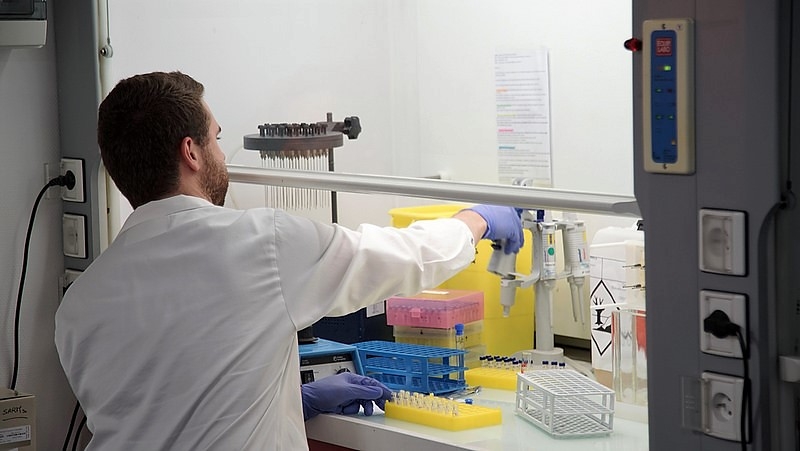
The project was aimed at building laboratory capacity in the OIRSA (Central American) and Caribbean regions by accrediting laboratory diagnostic tests for both terrestrial and aquatic transboundary diseases.
Working with accredited laboratory diagnostic tests has enabled beneficiary countries to comply with the sanitary requirements established in the World Organisation for Animal Health (WOAH) terrestrial and aquatic animal health codes and those set by destination markets.
The livestock sector is economically, socially and strategically important in the OIRSA region, accounting for as much as 50% of agricultural GDP in some countries. Foreign trade could expand significantly, which could increase the risk of introducing diseases to animals and humans. Supporting laboratories with accredited tests is needed to accurately diagnose these diseases.
One of OIRSA's aims is to support its member countries in ensuring the effective implementation of disease prevention, control and eradication programs. For several decades, OIRSA member countries have prioritized strengthening their laboratories. OIRSA-supported projects have been managed and implemented, however, budgetary constraints have led to inadequate staff training, and inadequate quality management systems to guarantee the credibility of the tests.
The project built the testing capacities of nine laboratories in the OIRSA region and the Caribbean, enhancing the beneficiary countries capacity to comply with the sanitary requirements established in the WOAH terrestrial and aquatic animal health codes, and those set by destination markets.
Accredited laboratory tests
Thirty-six diagnostic tests were accredited, surpassing the original target of 22, to ISO 17025. This was done to provide internationally recognized diagnoses and results in the aquaculture, cattle, poultry and pork sectors to facilitate trade opportunities.
- Rose Bengal and ELISA tests to detect bovine brucellosis antibodies and lateral flow immunochromatographic testing for bovine spongiform encephalopathy (BSE), accredited under the ISO 17025 standard in Guatemala.
- Real-time polymerase chain reaction (PCR) assay for the diagnosis of white spot disease in shrimp, accredited under the ISO 17025 standard in Belize.
- Real-time polymerase chain reaction (PCR) assays for the diagnosis of necrotizing hepatopancreatitis (NHP), infectious hypodermal and hematopoietic necrosis (IHHNV) in shrimp, and haemagglutination inhibition (HI) assays for the detection of the Newcastle disease virus, accredited under the ISO 17025 standard in El Salvador.
- Real-time polymerase chain reaction (PCR) assays for the diagnosis of Newcastle disease, and polymerase chain reaction (RT-PCR) assays for the detection of the avian influenza virus, and diagnosis of Mycobacterium bovis through bacterial isolation, accredited under the ISO 17025 standard in Honduras.
- Real-time polymerase chain reaction (PCR) assays for the diagnosis of white spot disease in shrimp, Rose Bengal and Rivanol tests for the detection of antibodies against bovine brucellosis and immunohistochemical testing to detect bovine spongiform encephalopathy (BSE), accredited under the ISO 17025 standard in Nicaragua.
- Conventional polymerase chain reaction (PCR) assays for the diagnosis of white spot disease in shrimp, diagnosis of brucellosis, using the Rose Bengal and ELISA technique accredited under the ISO 17025 standard in Panama.
- Real-time polymerase chain reaction (PCR) assays for the detection of the classical swine fever virus, the avian influenza virus and the Newcastle disease virus, accredited under the ISO 17025 standard in the Dominican Republic.
- Assay for the detection of bovine brucellosis by bacterial isolation and conventional polymerase chain reaction (PCR) assay, under the ISO 17025 standard in Costa Rica.
Regional network of laboratories established
The project established a regional network of laboratories to strengthen interpersonal and inter-laboratory linkages, facilitate joint training and exchange knowledge and ideas. The network increased the availability of reliable, internationally recognized diagnostic tests for specific diseases, while reducing costs and the time required to obtain results.
National reference laboratory system implemented
Within the regional network, eight laboratories adopted a quality management system and ensured that their staff was trained in accreditation. Guatemala's LARRSA laboratory was selected as a regional reference laboratory for classical swine fever disease, a reflection of the high quality of its services.
Deepening dialogue between chief veterinary officers and laboratory directors ensured that project stakeholders are kept up to speed with evolving animal health issues and trends. This enabled project stakeholders to take advantage of opportunities to build capacity for new diagnostic tests that were not part of the original project document. This enabled the project to adapt and remain relevant in the context of evolving needs in the region.
Working collaboratively with all the key project stakeholders to develop a comprehensive roadmap for follow-up by the participating laboratories and government authorities created the foundations for improved sustainability. This process ensured that all stakeholders understood their roles to maintain international accreditation. It also helped to ensure adequate resources for participating laboratories.